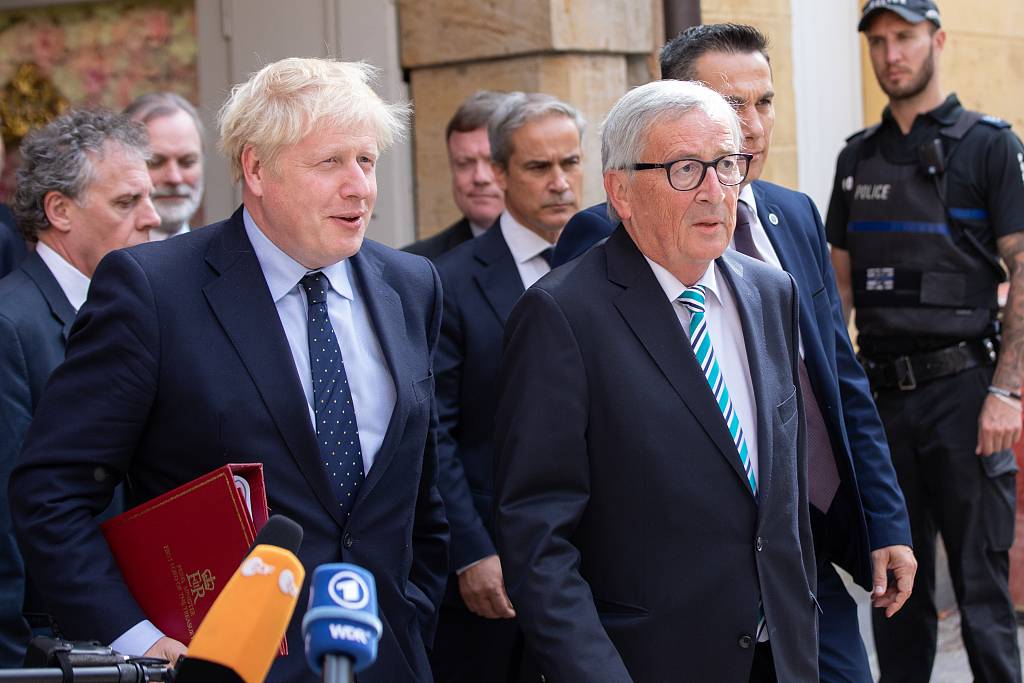Britain will accept the Supreme Court's upcoming ruling on whether the government's decision to suspend parliament was lawful, UK's Foreign Minister Dominic Raab said on Sunday.
"Of course we will respect whatever the legal ruling is from the Supreme Court, whether it's tomorrow or later in the week," Raab told the BBC.
Asked whether the government would consider suspending parliament for a second time – a move some have mooted as a way to force through Brexit on October 31 – Raab said: "Let's wait and see what the first judgment decides and then we'll understand the lie of the land."

Pedestrians pass the Supreme Court in London, UK, September 19, 2019. /VCG Photo
Pedestrians pass the Supreme Court in London, UK, September 19, 2019. /VCG Photo
Prime Minister Boris Johnson announced on August 28 that he had asked Queen Elizabeth to prorogue or suspend parliament for five weeks from last week until October 14, saying the shutdown was necessary to allow him to introduce a new legislative agenda.
Opponents said the real reason was to prevent scrutiny and challenges by parliament where he now has no majority to his Brexit plans, especially his promise to leave the European Union by October 31 even if no divorce deal has been agreed.
In a damning judgment, Scotland's highest court ruled on September 11 that the suspension was unlawful and was an "egregious" attempt to stymie parliament.
However, the High Court of England and Wales rejected a similar case, saying the matter was political and not one for judicial interference.
Both cases are now going before the Supreme Court, the highest judicial body in the United Kingdom, and its 11 judges will give a final ruling in the coming days on whether Johnson's advice to the queen was illegal.
Not too late for Brexit deal
There is still time for London and Brussels to make a Brexit deal, outgoing European Commission President Jean-Claude Juncker said in remarks published Sunday.
Juncker also told the Spanish daily El Pais that he wished the Commission had played a more active role in the 2016 British referendum to counteract "lies and fake news."
Juncker described as "constructive and partly positive" his talks with Johnson on Monday in Luxembourg.

Prime Minister Boris Johnson and European Commission President Jean-Claude Juncker emerge after a working lunch together in a restaurant in Luxembourg's city center, September 16, 2019. /VCG Photo
Prime Minister Boris Johnson and European Commission President Jean-Claude Juncker emerge after a working lunch together in a restaurant in Luxembourg's city center, September 16, 2019. /VCG Photo
"I believe that we still have a chance to reach an agreement," the paper quoted Juncker as saying.
"I don't share the views of those who think that Johnson is playing games with us and with himself," he said.
Asked whether there would be a new border between the British province of Northern Ireland and EU member Ireland if there was a no-deal Brexit, Juncker said: "Yes ... We have to make sure that the interests of the European Union and of the internal market will be preserved."
(With input from Reuters, AFP)
(Cover Photo: Dominic Raab, UK foreign secretary, departs following a meeting of cabinet ministers at number 10 Downing Street in London, UK, September 10, 2019. /VCG Photo)